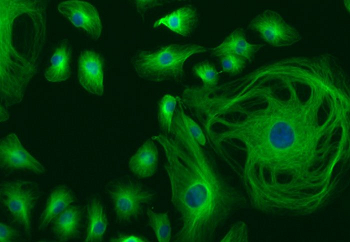 |
| Breast cancer cells used in the study--Courtesy of Imperial College London |
Scientists from Imperial College London have identified a type of regulatory RNA that is capable of controlling cancer cell migration and growth in breast and lung cancer. The findings could point toward a new treatment that targets the aggressive metastasis of these cancers--or help to inform oncologists at what stage the cancer is.
Senior author Justin Stebbing and his team published their work in the journal EMBO Reports last month.
Using next generation sequencing to mine all of the abundant genes being expressed in breast and lung cancer, the team fished out a micro-RNA called miR-515-5p--a short RNA species capable of regulating the expression of other genes by binding to their transcript and preventing their transcription from DNA to RNA.
By overexpressing miR-515-5p in two types of aggressive breast cancer cells they found that three genes were clearly silenced--indicating a possible interaction between the micro-RNA and the target genes.
When the researchers genetically knocked down one of these genes, called MARK4, in the two cell lines they observed a similar increase in miR-515-5p as the miR-515-5p overexpression. They further showed that a MARK4 overexpression rescues the inhibitory effect of miR-515-5p providing more evidence that this micro-RNA is controlling the reduced MARK4 expression.
Importantly, the expression of miR-515-5p is reduced in metastatic human tumors but not human primary tumors, further demonstrating the miR-515-5p/MARK4 relationship in aggressively dividing cancer cells. The same thing was true when they increased the amount of miR-515-5p in a mouse model of breast or lung cancer--the spread of cancer cells were prevented.
Conversely, when they looked at patients with either of the two cancers they found MARK4 expression correlated with lower survival rates.
"In our work we have shown that this silencer molecule is important in the spread of cancer. This is very early stage research, so we now need more studies to find out more about this molecule, and if it is present in other types of cancer," said Stebbing.
They will now focus on whether the micro-RNA or MARK4 are druggable and the feasibility of developing a diagnostic test for predicting the severity of cancers using these two markers.
- here's the release
- here's the article abstract